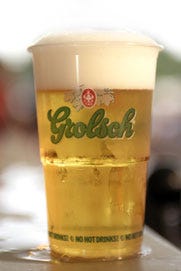Heightened awareness of the need for more sustainable answers to issues from material use to end-of-life solutions is leading to the development of projects based on closed-loop thinking and whole life cycle approaches. It's a trend that has been especially evident in the events and festivals organized this year around the world, with, of course, the London Olympics and Paralympics as the most notable examples of all.
September 6, 2012
Heightened awareness of the need for more sustainable answers to issues from material use to end-of-life solutions is leading to the development of projects based on closed-loop thinking and whole life cycle approaches. It's a trend that has been especially evident in the events and festivals organized this year around the world, with, of course, the London Olympics and Paralympics as the most notable examples of all.
With trash and litter forming one of the worst problems accompanying events of all kinds, it's no wonder that that's where the main focus has been up to now. London had - and with the Paralympic Games now in full swing, still has - its zero-waste-to-landfill vision, which included, among other things, implementing a rule that all food and packaging must be either recyclable or compostable.
Closing the loop
But it's not only London. Major festivals and events around the world are increasingly embracing the 'trashless' concept, with many introducing, among other things, biodegradable or compostable plastic service ware. Some go even further, attempting to 'close the loop' to further reduce the environmental impact. Below are just a few notable examples.
Recently, the ADAC Masters Weekend motorsport event was held at the racetrack in Lausitzring, in Germany. This event was part of a pilot project involving the use of disposable and biodegradable tableware. The disposable tableware was not made of a conventional plastic, but of paper coated with a thin layer of BASF's biodegradable plastic ecovio FS Paper. Cups will follow suit next season.
Ecovio FS Paper is a new development from BASF, made from partially bio-based ecoflex FS and PLA derived from cornstarch. Because the plastic coating is more than 50% renewably sourced, this tableware is composed of over 90% organic raw materials. It therefore did not have to be incinerated, but could be processed along with the organic waste, in order to yield valuable compost.

Grolsch
The resulting high-quality soil is subsequently targeted for use at the Lausitzring itself, in order to upgrade soil stressed by past open-pit mining operations. Development of this closed-loop system is a project that is unique on the European continent. The Lausitzring is the first large-scale event location in Europe to introduce such a system.At big Dutch events, beer brewer Grolsch, member of the SABMiller group, has been supplying PLA cups from manufacturer Huhtamaki that, when collected, can be composted, or even processed and (chemically) recycled into virgin quality lactic acid, from which, ultimately, new cups can be made. To ensure the used cups are gathered for recycling, special collection stations are established at the festivals.
Visitors who collect and return a certain number of cups receive tokens for a free Grolsch or soft drink. Obviously, the success of a closed-loop recycling system like this depends on having a reliable collection system in place - are there sufficient crewed collection points, for example? Could a mobile cup collector machine be the answer? Studies are still ongoing on the most effective solution and event organizers all over the world are closely watching the developments in this area.
Green Sports Alliance
In the U.S., sports events are also catching on. Green Sports Alliance is a non-profit organization with a mission to help sports teams, venues and leagues enhance their environmental performance. From Sept. 5 -7, the Alliance is holding its three-day 2nd Annual Summit in Seattle, where NatureWorks has created an Ingeo Eco-Innovation Lounge. Among other things, the lounge has third-party experts available to discuss strategies for moving toward "zero waste" at sports venues. Composting is one way to decrease waste and to lower overall operating costs for sports venues. Hence, at the lounge, the latest compostable foodservice and packaging products, such as fully compostable cups, lids, plates, trays, clamshell containers, and cutlery will be available. Ingeo-based food service ware is already in routine use at the Washington State Convention Center. Additional Ingeo-based compostable foodservice items are also being provided for use during summit breakout working sessions.
Play [sustainable] ball!
Another breakthrough occurred on Sept. 5, during the game between Green Sports Alliance member Seattle Mariners and the Boston Red Sox. The game saw the launch of a sustainable, bioplastic packaging for snacks made using biopolymers technology from BASF. The Seattle Mariners are this season seeking to divert 85% of the generated waste from landfills, up from just 12% in 2006. 
BASF ecovio
Mariners VP of Operations, Scott Jenkins, had his sights set on 90% diversion, but closing the gap has proven to be an elusive goal. "All of our service ware is already compostable, but snack food bags have been one of the biggest barriers preventing us from getting to our goal," said Jenkins. "Flexible packaging made with BASF biopolymers could represent the holy grail of greening for our waste stream."
It looks as if the events industry has finally realized that the time has come to clean up its act. The development of the new "Sustainability in event management standard" ISO 20121 "a management system standard that has been designed to help organizations in the events industry improve the sustainability of their event related activities, products and services" which was launched this past June is just another mark of how serious the industry takes sustainability today.
And in this industry, it would seem, biopolymers have the potential to play a valuable role in the striving to make things better.
About the Author(s)
You May Also Like


